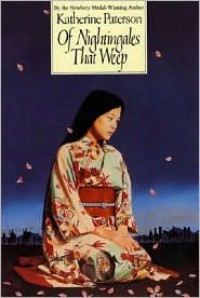

The daughter of a samurai never weeps. But Takiko, whose warrior father was killed in battle, finds this a hard rule, especially when her mother remarries a strange and ugly country potter. To get away from her miserable home, Takiko eagerly accepts a position at the imperial Japanese court. There, her beauty and nightingale voice captivate the handsome young warrior, Hideo -- who also turns out to be an enemy spy. As war breaks out, Takiko flees the court and is forced to choose between loyalty to her people and her love for Hideo. She painfully learns that whatever choice she makes, she cannot run away from her samurai honor.
Amazon.com
Of Nightingales That Weep takes place in feudal Japan, specifically the era of the Genpei War (1180-1185). In this story, Takiko, age 11, suffers the loss of her samurai father. Takiko's mother, discovering that there is little money left to her to live off of, sees little option but to quickly remarry, which she does. Takiko finds she is forced to accept Goro, a local potter, as her new stepfather. Goro does his best to win over Takiko, but well, when your biological father was a freakin' samurai, talk about pottery is a tough sell. Given time though, she starts to see sides to Goro that she does like. Just as she starts to accept her new life situation (by this time, entering her teens), Takiko is offered a position in the royal court, a lady in waiting to the princess. Takiko joins the court crew as a royal hairdresser and singer. Her singing catches the attention of Hideo (still not entirely sure if it's pronounced Hee-de-o or He-day-o), while his looks catch her attention.
"Take care, little one. Love is like a brushfire in August."
~ Lady Kiyomori to Takiko
Bummer for her, she comes to discover her warrior crush is actually a spy. But just as she's trying to sort out her tangled mess of a heart, war breaks out and the entire royal court is forced to flee the area, unsure of when they'll be able to return home.
I liked the environment building here but as far as the plot and character interactions went, this one didn't quite reach the level of intensity I was hoping for. Many of the characters seemed to have very little depth / dimension to them, too stiff to feel real or relatable. Though I will say, I did end up really liking the character of Goro! He was written well, the way he developed over the course of the story.
Though this takes place during a time of war, the main characters seemed to largely only experience it from afar, hearing stories of other people in battle. There are a few quick battle scenes here and there but they felt rushed to me -- a few arrows shot here and there, something set on fire and then boom. Done. Next scene.
I gave an extra half star for a scene near the end of the novel because it was pretty dramatic (and cinematic!) in the way things were described and the ceremonial behavior the characters take on. What they choose to do -- I would have never guessed that scene! I was honestly shocked and I wish the entire novel would have left me as tense and awe-struck as that scene. I am curious to check out Paterson's other books with this same theme / time period (though not necessarily same characters, I don't think). There was something to her environment building that I did really enjoy.

 1
1








